
We kindly inform you that, as long as the subject affiliation of our 300.000+ articles is in progress, you might get unsufficient or no results on your third level or second level search. In this case, please broaden your search criteria.


This paper focuses on a person being both a scientist and a politician who played a key role in socialist Hungary in the initiation of the opening towards the West. Ferenc Erdei (1910–1971) started his career as a soci-ologist in the early 1930s and was mainly involved in politics after 1945. Following the revolution in 1956, he drew back from his active political role. He established the Research Institute of Agricultural Economics of the Hungarian Academy of Sciences which became the the most import-ant background institution of the Agrarian Lobby. My paper argues that the experience Erdei gained from his study trips in Western Europe in the 1930s served later as a basis for the „bridge-building” between the socialist East and the capitalist West. In my paper I investigate which western countries Erdei launched the opening towards and through which channels he started to build a network as well as the political and professional debates that followed this process.
More...
Zajednica nije prost zbir svojih članova, već je biće više vrste, te se sreća zajednice ne postiže ugađanjem njenim sastavnim delovima, već služenjem ovih zajednici u čijoj sreći jedino i oni mogu naći svoju. Ko stane na drugo gledište, taj prvo razori zajednicu, a posle propadaju njeni članovi. Čovek po pravilu izbegava trud. Prima ga kao nuždu, kao nevolju. On po pravilu izbegava i opasnost. Prima je isto tako kao i trud. Cela priroda, i mrtva i živa, vlada se isto tako kao i prosečni čovek: ide linijom manjeg i najanjeg otpora. Samo sveci i junaci pobeđuju zakon inercije u sebi, izlaze ispod njegove vlasti. Zato su samo oni izuzeci. Prosečni čovek, dakle, građenje i uspinjanje prima samo kao ono što se izbeći ne može, kao nuždu, kao prinudu, inače ih izbegava. Ako kuću svoju ne pokrije kapaće mu za vratom, padaće mu u postelju voda. To ga prinuđava da se potrudi i namuči, ali da kuću pokrije. Očigledne, nepovoljne posledeice njegove lenosti stoje, dakle, kao prinuda i nagone ga da se potvrdui i namuči.
More...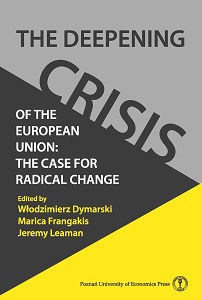
Author examines the particular effects of the financial crisis on the systems of social welfare within Europe. He identifies clear signs of a recommodification of welfare and the erosion of 'long cherished principles of reducing inequality, building and consolidating solidarity through a progressive social policy'. He highlights the particular threat to the 'solidarity model of asymmetrical mutuality' represented by destructive processes of austerity and the limited and contradictory ambitions of the Europe 2020 programme.
More...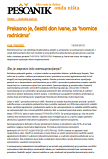
Ekonomska kriza i val radničkog nezadovoljstva potakli su prisjećanje na samoupravni socijalizam. I uvijek dobronamjerni don Ivan Grubišić je prosvjednicima Jadrankamena preporučio da u javnost iziđu s mitskom parolom tvornice radnicima. Prekasno je, čestiti don Ivane. Ne mogu se nesporazumi ispravljati novim nesporazumima.
More...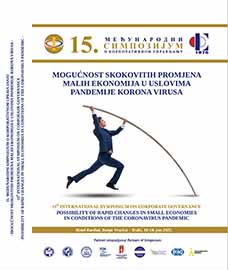
POSSIBILITY OF RAPID CHANGES IN SMALL ECONOMIES IN CONDITIONS OF THE CORONAVIRUS PANDEMIC
More...
The virus has impacted the economy through the following key channels: containment measures,and the supply and demand side problems caused by the disease. Lockdowns, cessation of certain services and public life, problems in organizing work-processes, problems in logistics and value chains at large, increased uncertainty, increased unemployment, and many others caused a simultaneous crunch on both the supply and the demand side of the economy.As a result of the simultaneous shock to both sides, the impact has been very strong, causing an endogenous spiral and resulting in a much higher overall impact than initially expected.The purpose of this paper is to present the impact of the virus-related crisis on the economies,with the focus on the European economy and Slovenia, relying on most recent available statistical resources. First, a brief theoretical background is provided, explaining more in detail how the virus impacted the economy. This is followed by an overview of the macroeconomic data, including a reflection to the financial and economic crisis 10 years ago. A sectoral perspective is provided next. The paper concludes with a selection of forecasts for the future.While the crisis has had a negative impact on the overall macroeconomic performance, significant sectoral as well as cross-country differences can be observed. Forecasting the future and overall impacts of the virus is at the moment very risky, however, the forecasts are unanimous in the evaluation that the crisis in 2020 will be significantly deeper than the crisis in 2009. Future effects and development of the crisis depend on a number of factors(1) the duration and type of restrictions, (2) government aid programs, (3) consumer behaviour), (4)timing of medication/vaccine, (5) unemployment rates, and (6) impact on household budgets.Primarily, it is important to understand that these factors could have very different impacts on different industries and countries.
More...
Our response to whether the rapid growth of small open economies is feasible in the conditions of this coronary virus pandemic is negative. That should not disappoint us since it is better to fix imbalances than to have unsustainable growth. We study in this paper the implementation of economic policy measures in Serbia and Bosnia and Herzegovina with the aim to identify their origin in the doctrines of neoliberalism, institutionalism, and state interventionism. State interventionism with ad hoc solutions and the creation of imbalances was the dominant but not the exclusive basis for conducting economic policy. We expect this policy mix to continue in the post-Covid19 period. At the same time, we point out the similarity of this crisis with the Great Recession of 2009. If we ignore this, there is a significant risk that we will repeat the mistakes of the past, the negative consequences of which were present until this crisis. We are not a priori against state intervention but its transformation into state fundamentalism. To avoid that, we propose its phased mitigation as the crisis evaporates. We do not share the optimism that Serbia and BiH will have high and sustainable growth in the medium term without changing economic policy and eliminating fundamental disturbances in the economy.
More...
The introduction of new customs duties represents a serious challenge for the organisation of global value chains and current patterns of the international division of production Such measures have further weakened the already fragile fundamentals of the post 2nd World War Bretton-Wood’s multilateral system. In the last couple of years, the appeal for a reorganization of the World Trade Organization has intensified. In this paper, we aim to study trade implications of the US-China trade war from a perspective of supply chain trade and the organisation of global value chains (GVCs). We first present the development of the tariff rates in the US and China over the course of the trade war and sum up early evidence on the US-China trade war effects from stock price volatility. Next, we discuss the differences in tariff impacts on traditional and supply chain trade. We continue with characterizing the US and China’s GVC position and resulting pressure for supply chain restructuring. Finally, we look at trade effects for the EU in different categories of goods. The involvement of the EU-28in GVCs is characterized in general with a more upstream position in trade with China, while backward participation strongly prevails in the EU-28 trade with the US, with notable differences among EU member states. Trade data for the two most recent years shows a certain degree of EU trade reorientation towards both the US and China, where an increased share of exports to the US has been driven by intermediate goods, while in exports to China consumer goods showed the strongest growth. The evidence on the adjustment of GVCs in wake of the US-China trade war suggests that an increase in trade costs has important implications for the organisation and location of GVC activities. We may expect that such a trend will be further strengthened in response to the current COVID-19 pandemic situation. Trade is likely to fall more steeply in sectors characterized by complex value chain linkages. Restructuring,shortening, and reorientation of GVCs will, expectedly, be even more pronounced since the COVID-19 crisis involves lockdown and social distancing causing major labour supply shocks and GVC disruptions.
More...
The current COVID-19 pandemic, as a powerful information weapon, is well on its way, if not already, to take the character of a religion. According to us, it is a false religion, because everything has become very pragmatic and prosaic. If the matter ended like that, it would be a kind of “biblical flood”. It is possible that the “supreme” has decided to exterminate a part of the world’s population by flood, certainly not all, but the question is, why is it so complicated and why does everything take so long. Has any “new” Noah already prepared the raft, and how much space is there on it! The objective question is, for how long, where,and to whom does this “rotten” humanism, which manifests itself in a couple of free “needle”stings, work? State donation!On the other hand, the uncertainty that comes with the time of an increasingly intense digital future produces different interpretations of where we are and what will happen. And while usually only a small number in an organization can clearly recognize a “burning platform”,for others it is, at best, just a little bit of smoke on the horizon.In this paper, given the many unknowns related to the corona crisis, we discuss more than we actually offer solutions on how to start the development spiral of the economies of less developed countries. As can be seen from the title of the paper, our starting position indicates that it is possible, but on a new paradigmatic basis, to trigger the momentum of digital transformation.The initial question is whether there is any hope that these economies, squeezed by the “yoke” of globalization, will turn the accumulated crisis into a real opportunity for their own economic revival that will deliberately, continuously and realistically increase GDP, living and working standards. For now, apparently, we have not predicted that the old Chinese curse “may we live in interesting times” will reach us.
More...
The paper points out the need, importance, determinants and policies of accelerating economic growth and development of the Western Balkan countries in the function of catching up and convergence with developed countries. The starting point is that to achieve this goal, adequate policies are needed at the macro and micro level, the implementation of which should ensure the strengthening of competitiveness of companies from these countries, appropriate integration into global value chains and catching up with market leaders from developed countries and at the same time convergence of the secountries with developed countries.The first part of the paper elaborates the experiences of Central and Eastern European countries, based on the application of information and communication technologies and the achievements of Industry 4.0 and their contribution to production and productivity growth, which for some of these countries was faster than in developed EU countries(EU15) and thus enabling them to catch up or reduce the development gap.The second part of the paper presents the experiences of developing countries, including Central and Eastern European countries, in the internationalization of their companies through foreign direct investment (OFDI), as determinants of acquiring and maintaining competitiveness and catching up with companies from developed countries as market leaders and contribute to the convergence of these countries with developed countries.The third part of the paper synthesizes the basic potentials, challenges and possible answers of the creators of economic and business policies of the Western Balkans as small open developing economies in the function of accelerating and sustainable economic growth and development at micro and macro level and their convergence with developed countries.
More...
The widespread digital transformation resulting from the influence of three megatrends - globalization, dynamic development of technology and the new consumer on the market, has forced companies to adapt to new market conditions. The consumer, who is the last link in the chain, focusing only on consumption, is now the co-creator of the market offer. He is more sensitive to marketing messages using modern tools such as mobile devices, among others. This study presents the process of adaptation of the Costa Coffee brand to the new market environment on the example of its loyalty program.
More...
The article is a summary of research on the actual and potential integration of environmental insurance and ISO 14001 environmental management systems (EMSs) in Poland. The aim ofthe research is to analyze the relationship of the above-mentioned instruments of environmental risk management and to identify the factors determining the propensity of enterprises to implement such elements of the system that will increase the usefulness of ISO 14001 standards for insurance purposes in the future. The data for the study were obtained through an asynchronous group interview conducted on the Bulletin Board platform among insurance sector experts and through a survey of organizations that implemented the ISO 14001 system in Poland. Template analysis of qualitative data, supported by narrative techniques and statistical analysis based on the chi-square test of independence, U Mann–Whitney test, Kruskal–Wallistest, Spearman’s rank correlation coefficient were used to interpret the data. Environmental management systems according to ISO 14001 are not, in their current form, used in the process of providing insurance cover for environmental risk. Organizations managed according to ISO14001 rarely design and implement solutions useful to insurers. The latter, however, are statistically significantly correlated with the awareness attributes of the organization. Awareness attributes were also strongly related with the variables describing the propensity to implement additional – useful for insurance purposes – EMSs elements. The strongest motivators for the above, however, were of a non-insurance nature (e.g. obtaining tax credit).
More...
Kadro Dergisi 1932 Ocak ayında “Siyasi ve entelektüel” türde yayın olarak hayata başlamıştır. Derginin yayınlandığı 1932- 1934 yılları arasında, yönetim anlayışının düşünsel dünyasında, bir tarafta batı dünyasında, 1929 ekonomik krizi ile tartışılan serbest piyasa düşüncesi, diğer taraftan ise Marksist diyalektik anlayışta, “maddi dünyanın bilinçli şekillendirilmesi ile insan davranışlarının kendiliğinden şekilleneceği” düşüncesinin olduğu bir dönemdir. Dönemdeki bir başka gelişme ise ikinci dünya savaşına giden süreç içinde, yerel ve radikal bir akım olarak Nasyonal Sosyalizm’in yükselme döneminde olmasıdır.
More...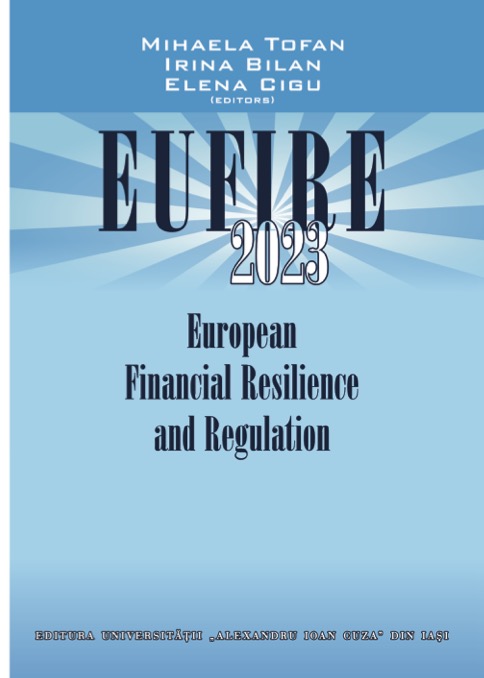
The book aims to offer the framework for the main challenges faced within European Union and globally, emphasizing the regulatory perspective for the financial sector in particular, and also for the business sector, in general.
More...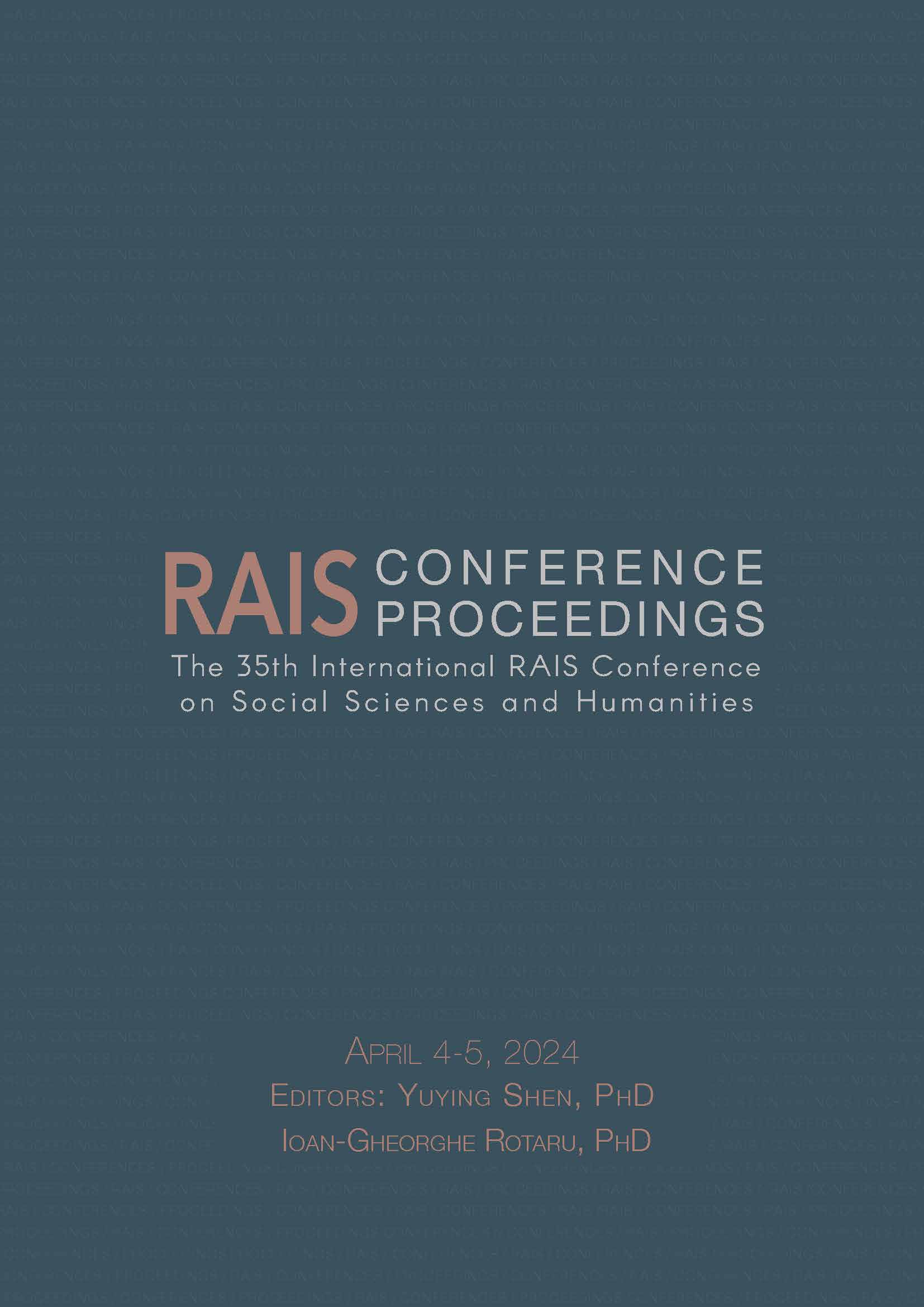
This publication presents the proceedings of the 35th International RAIS Conference on Social Sciences and Humanities held at American University in Washington DC, USA, on April 4-5,2024.
More...
This paper is based on the views of Marx, as well as the economists before and after Marx, regarding surplus value. The authors analyze the allocation of surplus value in a socialist-oriented market economy in Vietnam. The result shows that in Vietnam, capitalists do not occupy the entire surplus created by workers, as Marx mentioned, so the existence of surplus value in Vietnam today is not contrary to the socialist direction because of its necessity. Additionally, the authors identify problems in the distribution of surplus value that need to be addressed in the practice of the social-oriented market economy in Vietnam today. Some recommendations are also proposed to effectively allocate surplus value for Vietnamese enterprises, workers, and labor unions.
More...